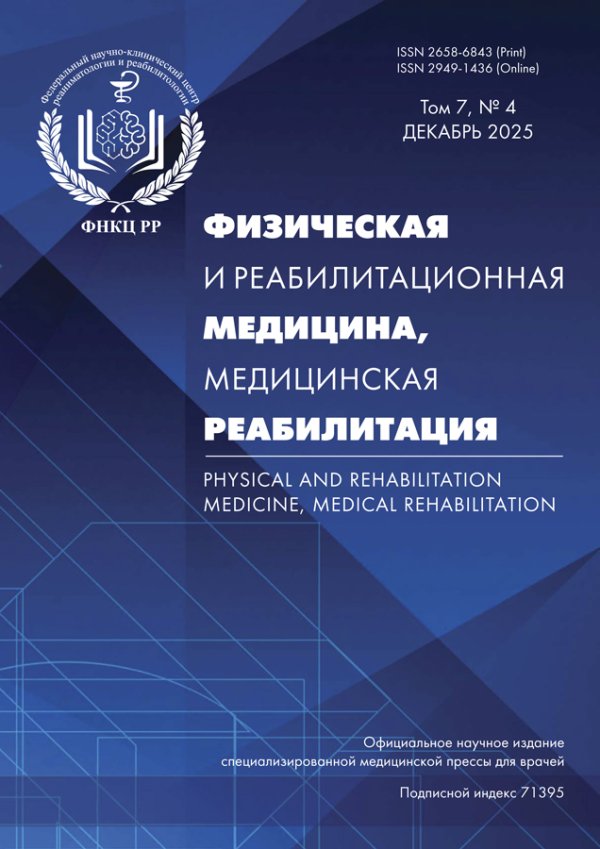Prospects for microbiota-oriented therapy in neurorehabilitology
- Authors: Beloborodova N.V.1, Chernevskaya E.A.1
-
Affiliations:
- Federal State Budgetary Scientific Institution “Federal Research and Clinical Center of Intensive Care Medicine and Rehabilitology”
- Issue: Vol 2, No 1 (2020)
- Pages: 79-85
- Section: New methods and technologies, discussions
- URL: https://journal-vniispk.ru/2658-6843/article/view/19432
- DOI: https://doi.org/10.36425/rehab19432
- ID: 19432
Cite item
Full Text
Abstract
Intensive accumulation of data on the role of bacteria in complex regulatory mechanisms of the nervous system allows us to predict the transition to a new level in the treatment of brain dysfunctions. This problem-oriented article analyzes recent publications that reflect the relationship of changes in the profile of microbiota metabolites with the course and outcome of the disease in patients with central nervous system damage. Based on the results of biomarker monitoring in patients with prolonged neurorehabilitation in the Intensive care unit, the authors justify a metabolomic approach for correction in the microbiota–gut–brain system.
Full Text
##article.viewOnOriginalSite##About the authors
N. V. Beloborodova
Federal State Budgetary Scientific Institution “Federal Research and Clinical Center of Intensive Care Medicine and Rehabilitology”
Author for correspondence.
Email: nvbeloborodova@yandex.ru
ORCID iD: 0000-0001-7222-4140
Dr. of medical science
Russian Federation, 25-2, Petrovka street, Moscow,107031E. A. Chernevskaya
Federal State Budgetary Scientific Institution “Federal Research and Clinical Center of Intensive Care Medicine and Rehabilitology”
Email: kate.chernevskaya@gmail.com
ORCID iD: 0000-0002-9316-8907
к.б.н., ведущий научный сотрудник лаборатории метаболизма при критических состояниях
Russian Federation, 25-2, Petrovka street, Moscow,107031References
- Dovrolis N, Kolios G, Spyrou GM, Maroulakou I. Computational profiling of the gut-brain axis: microflora dysbiosis insights to neurological disorders. Brief Bioinform. 2017;20(3):825−841. doi: 10.1093/bib/bbx154.
- Carabotti M, Scirocco A, Maselli MA, Severi C. The gut-brain axis: interactions between enteric microbiota, central and enteric nervous systems. Ann Gastroenterol. 2015;28(2):203−209. PMCID: PMC4367209, PMID: 25830558
- Braniste V, Asmakh M, Kowal C, et al. The gut microbiota influences blood-brain barrier permeability in mice. Sci Transl Med. 2014;6(263):263ra158. doi: 10.1126/scitranslmed.3009759.
- Fung TC, Olson CA, Hsiao EY. Interactions between the microbiota, immune and nervous systems in health and disease. Nat Neurosci. 2017;20(2):145−155. doi: 10.1038/nn.4476.
- Kau AL, Ahern PP, Griffin NW, et al. Human nutrition, the gut microbiome and the immune system. Nature. 2011;474(7351):327−336. doi: 10.1038/nature10213.
- Savidge T, Sofroniew M, Neunlist M. Starring roles for astroglia in barrier pathologies of gut and brain. Lab Invest. 2007;87(8):731–736. doi: 10.1038/labinvest.3700600.
- Singh V, Roth S, Llovera G, et al. Microbiota dysbiosis controls the neuroinflammatory response after stroke. J Neurosci. 2016;36(28):7428−7440. doi: 10.1523/JNEUROSCI.1114-16.2016.
- Kundu P, Lee HU, Garcia-Perez I, et al. Neurogenesis and prolongevity signaling in young germ-free mice transplanted with the gut microbiota of old mice. Sci Transl Med. 2019;11(518):eaau4760. doi: 10.1126/scitranslmed.aau4760.
- Anand KS, Dhikhav V. Hippocampus in health and disease: An overview. Ann Indian Acad Neurol. 2012;15(4): 239–246. doi: 10.4103/0972-2327.104323.
- Острова И.В., Голубева Н.В., Кузовлев А.Н., Голубев А.М. Прогностическая значимость и терапевтический потенциал мозгового нейротрофического фактора BDNF при повреждении головного мозга (обзор) // Общая реаниматология. — 2019. — Т. 15. — № 1. — С. 70−86. [Ostrova IV, Golubeva NV, Kuzovlev AN, Golubev AM. Prognostic value and therapeutic potential of brain-derived neurotrophic factor (BDNF) in brain injuries (review). General reanimatology. 2019;15(1):70–86. (In Russ).] doi: 10.15360/1813-9779-2019-1-70-86.
- Rinninella E, Cintoni M, Raoul P, et al. Food components and dietary habits: keys for a healthy gut microbiota composition. Nutrients. 2019;11(10):E2393. doi: 10.3390/nu11102393.
- Berendsen A, van de Rest O, Feskens E, et al. Changes in dietary intake and adherence to the NU-AGE diet following a one-year dietary intervention among European older adults-results of the NU-AGE randomized trial. Nutrients. 2018;10(12):1905. doi: 10.3390/nu10121905.
- Bravo JA, Forsythe P, Chew MV, et al. Ingestion of Lactobacillus strain regulates emotional behavior and central GABA receptor expression in a mouse via the vagus nerve. Proc Natl Acad Sci U S A. 2011;108(38):16050−16055. doi: 10.1073/pnas.1102999108.
- Foster JA, McVey Neufeld KA. Gut-brain axis: how the microbiome influences anxiety and depression. Trends Neurosci. 2013;36(5):305−312. doi: 10.1016/j.tins.2013.01.005.
- Stanley D, Mason LJ, Mackin KE, et al. Translocation and dissemination of commensal bacteria in poststroke infection. Nat Med. 2016;22(11):1277−1284. doi: 10.1038/nm.4194.
- Xu R, Tan C, Zhu J, et al. Dysbiosis of the intestinal microbiota in neurocritically ill patients and the risk for death. Crit Care. 2019;23(1):195. doi: 10.1186/s13054-019-2488-4.
- Averina OV, Danilenko VN. [Human intestinal microbiota: role in development and functioning of the nervous system. (In Russ).] Microbiology. 2017;86(1):5−24. doi: 10.1134/S0026261717010040.
- Lucas P, Landete J, Coton M, et al. The tyrosine decarboxylase operon of Lactobacillus brevis IOEB 9809: characterization and conservation in tyramine-producing bacteria. FEMS Microbiology Letters. 2003;229(1):65−71. doi: 10.1016/S0378-1097(03)00787-0.
- Beloborodova N, Buyakova I, Chernevskaya E. Is antibiotic treatment always necessary for chronic critical ill patients? Intensive Care Medicine Experimental. 2019;7(Suppl 2):33.
- Черневская Е.А., Белобородова Н.В. Микробиота кишечника при критических состояниях (обзор) // Общая реаниматология. — 2018. — Т. 14. — № 5. — С. 96−119. [Chernevskaya EA, Beloborodova NV. Gut microbiome in critical illness (review). General reanimatology. 2018;14(5): 96–119. (In Russ).] doi: 10.15360/1813-9779-2018-5-96-119.
- Rao АV, Bested AC, Beaulne TM, et al. A randomized, double-blind, placebo-controlled pilot study of a probiotic in emotional symptoms of chronic fatigue syndrome. Gut Pathogens. 2009;1(1):6. doi: 10. 1186/1757-4749-1-6.
- Rao SS, Yu S. Response to sachdeva et al: brain fogginess and SIBO is not a mirage. Clin Transl Gastroenterol. 2018;9(10):194. doi: 10.1038/s41424-018-0061-0.
- Besselink MG, van Santvoort HC, Buskens E, et al. Probiotic prophylaxis in predicted severe acute pancreatitis: a randomized, double-blind, placebo-controlled trial. Lancet. 2008;371(9613):651−659. doi: 10.1016/s0140-6736(08)60207-x.
- Bongaerts GP, Severijnen RS. A reassessment of the PROPATRIA study and its implications for probiotic therapy. Nat Biotechnol. 2016;34(1):55–63. doi: 10.1038/nbt.3436.
- Beloborodova NV, Grechko AV, Olenin AY. Metabolomic discovery of microbiota dysfunction as the cause of pathology. IntechOpen; 2019. doi: 10.5772/intechopen.87176.
- Kiryachkov YY, Grechko AV, Kolesov DL, et al. Monitoring of the effectiveness of intensive care and rehabilitation by evaluating the functional activity of the autonomic nervous system in patients with brain damage. General Reanimatologiya. 2018;14(4):21−34. doi: 10.15360/1813-9779-2018-4-21-34.
- Beloborodova NV, Olenin AY, Pautova AK. Metabolomic findings in sepsis as a damage of host-microbial metabolism integration. J Critical Care. 2018;43:246−255. doi: 10.1016/j.jcrc.2017.09.014.
- Beloborodova NV, Sarshor YN, Bedova AY, et al. Involvement of aromatic metabolites in the pathogenesis of septic shock. Shock. 2018;50(3):273−279. doi: 10.1097/shk.0000000000001064.
- Beloborodova NV. Interaction of host-microbial metabolism in sepsis. IntechOpen; 2016. doi: 10.5772/68046.
- Williams RA, Mamotte CD, Burnett JR. Phenylketonuria: an inborn error of phenyl-alanine metabolism. Clin Biochem Rev. 2008;29(1):3141. PMCID: PMC2423317, PMID: 18566668
- Гецина М.Л., Черневская Е.А., Белобородова Н.В. Роль общих для человека и микробиоты метаболитов триптофана при тяжелых заболеваниях и критических состояниях (обзор) // Клиническая практика. 2020 (опубликован on line) [Getsina ML, Chernevskaya EA, Beloborodova NV. The role of human and microbial metabolites of triptophane in severe diseases and critical III (review). Journal of Clinical Practice. 2020, in print. (In Russ)] doi: 10.17816/clinpract19068.
- O’Mahony SM, Clarke G, Borre YE, et al. Serotonin, tryptophan metabolism and the brain-gut-microbiome axis. Behav Brain Res. 2015;277:32−48. doi: 10.1016/j.bbr.2014.07.027.
- Pautova AK, Bedova AY, Sarshor YN, Beloborodova NV. Determination of aromatic microbial metabolites in blood serum by gas chromatography–mass spectrometry. J Analytical Chemistry. 2018;73:160−166. doi: 10.1134/s1061934818020089.
- Beloborodova NV, Chernevskaya EA, Pautova AK, et al. Altered serum profile of aromatic metabolites reflects the biodiversity reduction of gut microbiota in critically ill patients. Critical Care. 2018;22(Suppl 1):82. doi: 10.1186/s13054-018-1973-5.
Supplementary files








